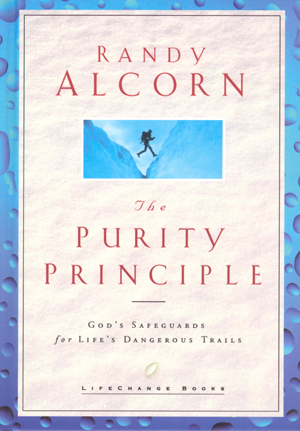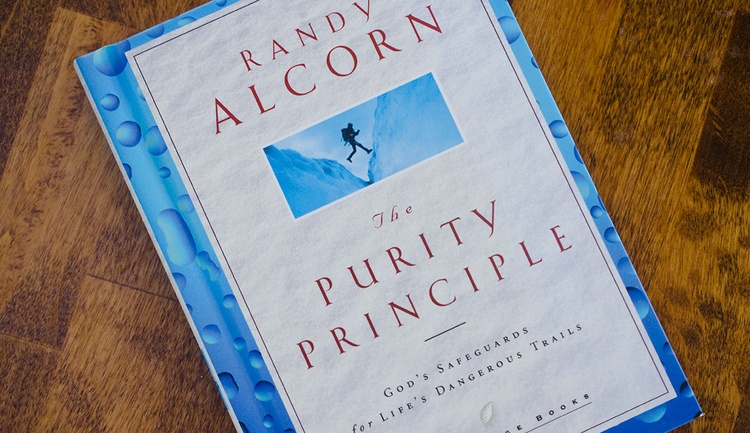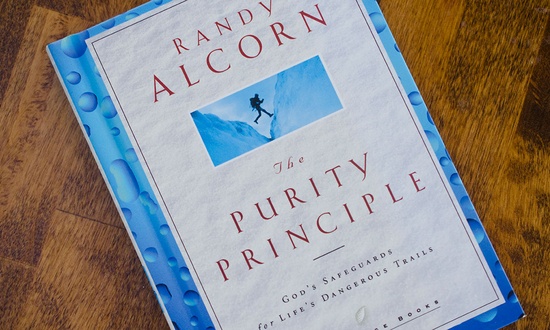 Chapter One: Forfeiting What Could Have Been
Chapter One: Forfeiting What Could Have Been
Chapter Two: Enlightened Self Interest
Chapter Three: What’s the Big Deal about Sex?
Chapter Four: Targeted and Vulnerable
Chapter Five: The Battle’s in Your Mind
Chapter Six: Wise Strategies
Chapter Seven: Getting Radical
Chapter Eight: Guidelines for Singles
Chapter Nine: Guidelines for Couples and Parents
Chapter Ten: Confession, Accountability, and Counting the Cost
Conclusion: A Battle We Can Win
Eric stormed into my office and flopped into a chair. “I’m really mad at God.”
Having grown up in a strong church family, he’d met and married a Christian girl. Now he was the picture of misery.
“Okay...so why are you mad at God?”
“Because,” he said, “Last week I committed adultery.”
Long pause. Finally I said, “I can see why God would be mad at you. But why are you mad at God?”
Eric explained that for several months he’d felt a strong, mutual attraction with a woman at his office. He’d prayed earnestly that God would keep him from immorality.
“Did you ask your wife to pray for you?” I said. “Did you stay away from the woman?”
“Well...no. We went out for lunch almost every day.”
Slowly, I started pushing a big book across my desk. Eric watched, uncomprehending, as the book inched closer and closer to the edge. I prayed aloud, “O Lord, please keep this book from falling!”
I kept pushing and praying. God didn’t suspend the law of gravity. The book went right over the edge, smacking the floor.
“I’m mad at God,” I said to Eric. “I asked Him to keep my book from falling...but He let me down!”
Here’s what’s striking about Eric, Lucinda, Tiffany and Kyle. They all thought they were acting in their own best interests when they followed their lusts. If we could have obtained an honest interview with any of them just before they trashed their purity, they would have said, “This is for me. This is for my happiness.”
Yet it wasn’t.
Not even close.
It never is.
In fact, they didn’t just hurt others. They acted against their own self-interests.
What they did wasn’t just wrong. It was stupid.
From the time we were young teenagers, many of us have had heard lists of reasons for walking in sexual purity. God commands purity and forbids impurity. Purity is right. Impurity is wrong.
True? Absolutely. But it’s equally correct to say, Purity is always smart. Impurity is always stupid.
There it is—what I’m calling the purity principle:
Purity is always smart; Impurity is always stupid.
Not sometimes.
Not usually.
Always.
A holy God made the universe in such a way that what’s true to His character, and the laws derived from His character, is always rewarded. What violates His character is always punished. He rewards every act of justice; He punishes every act of injustice.
That doesn’t mean God always intervenes directly. This moral law is like the law of gravity. God has set it in place. When a careless driver speeds on an icy mountain pass, loses control, and plunges his car off a cliff, God doesn’t suddenly invent gravity to punish the driver’s carelessness. Gravity is already in place.
In the same way, God doesn’t need to punish the pornography addict for every wrong choice. The punishment is built in to the sin. Shame, degradation, and warping of the personality follow as a matter of course. Scripture describes those who have surrendered to their lust to live in immorality as “receiving in their own persons the due penalty of their error” (Romans 1:27).
That’s the way God’s moral universe operates. We get to choose our own path. But with each path comes inevitable consequences.
The roads of life are sometimes hazardous. But God loves us enough to place warning signs: “Don’t commit adultery” and “No sex before marriage.” We don’t have to obey. We do have to live with the consequences.
Purity is safe. Impurity is risky. Purity always helps us. Impurity always hurts us. Purity is always smart; impurity is always stupid. Write it down. Bank on it.
One night as a young pastor I chose to view pornography. I felt terrible. I’d let down my Lord, my wife, my church. I’d been a fool. I was frightened by what I’d done, by the power of the sin within me. I caught a horrifying glimpse of what I could easily become. But feeling guilt and shame did nothing to empower me to victory. That only came when I began to think—and choose—differently.
Do you really want to be like an ox led to slaughter? If so, then keep flirting with that man next door, or the new receptionist at the office. Keep thinking about messing with that girl or boy who sits next to you in class. Keep watching those television commercials and sit-coms and movies that shoot sex at you like arrows. The slaughter is exactly where you’re headed.
But if you want something better, something wonderful, choose purity instead.
It’s okay to be out there “for yourself” on this issue. It’s right to guard your virginity. It’s good for you to encourage your children to save themselves for marriage, not only for God’s glory but for their own happiness!
It’s completely fitting to hold out the prospect of grief and self-destruction as reasons to avoid impurity. That’s exactly what Proverbs does.
One of our church’s elders admitted to me, “There have been times when I’ve had serious temptations toward adultery. I’d like to say that my love for God and for my wife were enough to keep me from falling. But it came down to sheer terror. I was certain that if I traveled that road, God would let my life turn miserable.”
He’s a wise man. A man who acted in his own best interests. He knows impurity will be punished and purity will be rewarded, with heaven’s payoffs. It would be a lousy trade. He was too smart to make it.
Is that a lesser, unworthy motivation? No! This brother never fell. He never shipwrecked his family. He never shamed his church. He never broke his wife’s heart. He never devastated his children. He never trashed his ministry.
Think his wife and children are grateful for the fear of God that kept him pure in the face of dark temptations? Absolutely.
The fear of God shouldn’t scare us out of our wits, it should scare us into them. “The fear of the LORD is a fountain of life, turning a man from the snares of death” (Proverbs 14:27).
Those who’ve succumbed to sexual temptation did not do so to pursue their self-interest. Rather, they pursued what they imagined was their self-interest, what Satan deceived them into thinking was their self-interest. Had they pursued their true self-interest they would have run from temptation as from a slithering cobra, a live grenade. They would have embraced purity as a drowning person grabs a life-preserver. And how different their lives and families would be today if they had!
When God calls on you to pursue purity, you are not being asked to do what will deprive you of joy. In fact, you are being called on to do what will bring you the greatest joy!
To choose purity is to put yourself under God’s blessing. To choose impurity is to put yourself under God’s curse.
It’s your decision. You cast your vote with every choice. Those choices amount to one of two prayers:
“God, bless me for obeying You”
“God, curse me for disobeying You”
“But we really love each other” has no bearing on the ethics of sexual intimacy. Sex does not become permissible through subjective feelings, but only through the objective, lifelong commitment of marriage. Those are God’s rules. There’s nothing we can do to change them. The rules are always enforced. When we break them they always break us.
A smart traveler doesn’t curse guardrails. He doesn’t whine, “That guardrail dented my fender!” He looks over the cliff, sees demolished autos, and thanks God for guardrails.
God’s guardrails are his moral laws. They are there not to punish or deprive us but to protect us. God doesn’t forbid us fleeting pleasures out of malice. Rather, he calls us to higher and lasting pleasures out of love. His warnings stand between us and destruction.
Temptations always look good—otherwise they wouldn’t be temptations. We must believe God that what Satan says will be good, will in fact turn out bad. Always. Resisting temptation is a gutsy, courageous, stubborn refusal to violate God’s law. It’s repeatedly calling upon Christ for the strength to say “no” to the world, the flesh, and the devil—to say “yes” to God instead. We do this in pursuit of the ultimate joy that can only be found in knowing God.
Remember that Beatles song where Ringo Starr sang, “All I gotta do is act naturally”?
The truth is, if you act naturally you’re toast.
But if you act supernaturally, drawing on the power of the indwelling Christ, you’ll enjoy great personal benefits, now and later.
Sooner or later, sexual sin will be exposed. “You may be sure that your sin will find you out” (Numbers 32:23).
Solomon said, “The man of integrity walks securely, but the man who takes crooked paths will be found out” (Proverbs 10:9).
Here’s a thought that should give everyone pause—There’s no such thing as a private moment.
Jesus warned His disciples: “There is nothing concealed that will not be disclosed, or hidden that will not be made known. What you have said in the dark will be heard in the daylight, and what you have whispered in the ear in the inner rooms will be proclaimed from the roofs” (Luke 12:1-3).
One of Satan’s oldest tactics is to weave a phony web of secrecy, casting an illusion of privacy over our sinful choices. He tells us, “No one is watching. No one will know.”
But he’s lying. Someone is watching—the Audience of One. Someone already knows. And in time, many will know.
We never get away with anything.
Superior Satisfaction
A sexual image lures my mind toward lust. The world, the flesh and the devil barrage me with messages: I will feel like a man or a woman; it will relieve my pain, disappointment, stress. I’ll be happier if I surrender.
God’s Word shows the lie for what it is. It tells me that real happiness can only be found in Christ.
I’m left with the choice—trust Satan or trust God.
I must choose between sexual fantasies and intimacy with God. I cannot have both. When I see that God offers me joys and pleasures that sexual fantasies don’t, this is a breakthrough. But that breakthrough will come only when I pursue God, making Him the object of my quest—and when I realize that fantasies are only a cheap God-substitute. Running to them is running from God.
When my thirst for joy is satisfied by Christ, sin becomes unattractive. I say no to the passing pleasures of immorality, not because I do not want pleasure, but because I want true pleasure, a greater and lasting pleasure that can only be found in Christ.
John Piper says,
The fire of lust’s pleasures must be fought with the fire of God’s pleasures. If we try to fight the fire of lust with prohibitions and threats alone—even the terrible warnings of Jesus—we will fail. We must fight it with a massive promise of superior happiness. We must swallow up the little flicker of lust’s pleasure in the conflagration of holy satisfaction.
Those who drink of immorality are never satisfied (John 4:13). Those who drink of Jesus are fully satisfied (John 6:35). I can either have my thirst quenched in Jesus, or I can plunge deeper into sin in search of what’s not there.
The rest of your life will be largely determined by how you answer this question:
Who will you believe?
Setting Boundaries
To protect our purity we need to set mental boundaries.
On a scale of one to ten, adultery or pornography addiction might be a ten, at the top of a ladder. But the question is, what were the bottom rungs of that ladder—the ones, twos, and threes? When we identify those, disaster prevention can take place.
Of course, prevention’s not always easy—but it’s a lot easier than the alternative: misery.
Often we say we want purity, but then we make choices which sabotage purity. Choices have consequences. If we want different consequences we must make different choices.
A Covenant With Your Eyes
Job says, “I made a covenant with my eyes not to look lustfully at a girl” (Job 31:1). Job made a commitment to guard his heart by guarding his eyes. The verses that follow spell out the terrible consequences should he not live by this covenant of purity (Job 31:2-12).
A covenant is an agreement between God and man. In this case we make a sacred commitment to God—and to our families and comrades. The agreement is to not look at—and to immediately turn away from—whatever pulls us toward lust.
Have you made a contract with your eyes, to not look where they shouldn’t?
Are you practicing this purity covenant when you walk across campus? When you work out? When you drive? When you select television shows? When you’re at church?
Have you announced your covenant to others? Have you asked them to pray for you and hold you accountable to it? Have you restated your covenant before God?
If not, why not do it now?
Parable of the Doughnuts
Imagine someone whose weakness is eating doughnuts. His doctor says, “No more doughnuts.” He vows to God, “No more doughnuts.” He promises his family “No more doughnuts.” He calls the church and gets on the prayer chain. He even goes to a doughnut deliverance ministry to have the demon of doughnut desire cast out of him.
Here’s a guy who means business, right?
But then what does he do? Well, if he’s like a lot of us, he goes right on reading about doughnuts, listening to doughnut music, and watching television programs about making doughnuts. He spends his time with other doughnut lovers talking about doughnuts, joking about doughnuts at the office, where he often glances at the doughnut calendars on the wall. He looks through the newspaper for doughnut coupons and subscribes to Doughnut Desires, with its glossy, color photos.
It’s not long before he’s driving to work the long way that “just happens” to go by a doughnut shop. He rolls down the window and inhales. Pretty soon he’s buying the morning paper from the rack right outside the doughnut shop. He’s lingering just long enough to check out doughnuts through the window.
Then he remembers he has to make a phone call, and hey, what do you know, the doughnut shop has a pay phone. And since he’s there anyway, why not have a cup of coffee?
Now, remember, this man has no intention of breaking his vow and eating doughnuts. But the totally predictable and inevitable result is—what? That he will give in and eat doughnuts!
And can’t you just hear his sad lament? “What went wrong? I prayed! I asked others to pray. I asked God for deliverance. Why try? I give up. You do your best and look what happens!”
The First and Most Basic Strategy
If we learn nothing else from the parable of the doughnuts, we should learn that sincere intentions, and even prayers, are not enough. To have victory over temptation we must have clear goals and sound strategies, and we must diligently carry them out.
What’s our first line of defense against impurity?
“Flee from sexual immorality” (1 Corinthians 6:18).
Cultivate Your Inner Life
There’s a danger that a book like this can appear to be behavior modification. I’m well aware that simple guidelines and the “just try harder” exhortation aren’t enough to break the grip of lust, or the power of deeply ingrained habits. There is no “easy little formula.”
I cannot emphasize enough the importance of drawing on the indwelling power of the risen Christ. Self-reformation is not enough. It may bring limited benefits, but it will lead to self-righteousness, not Spirit-empowerment—and nothing sets us up for moral failure like self-righteousness. The Christian life is far more than sin management. It is a divine transformation and enablement to live righteously.
Yet that doesn’t mean practical steps are pointless. Scripture commands us to do and not do certain things that are within our power. And often, in doing these things, our hearts change. So we should take wise steps, knowing that they are not sufficient, but they are necessary. Ultimately, the battle for purity is won or lost in quietness, on our knees with God and in collaboration with our fellow soldiers.
Busyness wears down our ability to hear the promptings of God’s Spirit, His Word, and His people. Fatigue makes us oblivious to what’s really happening. Healthy self-examination reveals to us our “triggers”—the situations that tempt us. We then take these to God.
Time with God is the fountain from which holiness flows...and joy, and delight.
Getting Radical
Suppose I said, “There’s a great-looking girl down the street. Let’s go look through her window and watch her undress, then pose for us naked, from the waist up. Then this girl and her boyfriend will get in a car and have sex—let’s listen and watch the windows steam up!”
You’d be shocked. You’d think, “What a pervert!”
But suppose instead I said, “Hey, come on over. Let’s watch Titanic.”
Christians recommend this movie, church youth groups view it together, and many have shown it in their homes. Yet the movie contains precisely the scenes I described.
So, as our young men lust after bare breasts on the screen, our young women are trained in how to get a man’s attention.
How does something shocking and shameful somehow become acceptable because we watch it through a television instead of a window?
In terms of the lasting effects on our minds and morals, what’s the difference?
Yet many think, “Titanic? Wonderful! It wasn’t even rated R!”
Every day Christians across the country, including many church leaders, watch people undress through the window of television. We peek on people committing fornication and adultery, which our God calls an abomination.
We’ve become voyeurs, peeping toms, entertained by sin.
Normalizing Evil
The enemy’s strategy is to normalize evil. Consider a young person struggling with homosexual temptation. How does it affect them when they watch popular television dramas where homosexual partners live together in apparent normality?
Parents who wouldn’t dream of letting a dirty-minded adult baby-sit their children do it every time they let their kids surf the channels.
Not only we, but our children become desensitized to immorality. Why are we surprised when our son gets a girl pregnant if we’ve allowed him to watch hundreds of immoral acts and hear thousands of jokes with sexual innuendoes?
“But it’s just one little sex scene.”
Suppose I offered you a cookie, saying “A few mouse droppings fell in the batter, but for the most part it’s a great cookie—you won’t even notice.”
“To fear the LORD is to hate evil” (Proverbs 8:13). When we’re being entertained by evil, how can we hate it? How can we be pure when we amuse ourselves with impurity?
Romans 13:14 instruct us to “make no provision for the flesh.” It’s a sin to deliberately put ourselves in a position where we’ll likely commit sin. Whether it’s the lingerie department, the swimming pool, the workout room at an athletic club, if it trips you up, stay away from it.
Proverbs describes the loose woman meeting up with the foolish man after dark (Proverbs 7:8-9). We must stay away from people, places and contexts that make sin more likely.
If it’s certain bookstores or hangouts, STAY AWAY FROM THEM. If cable or satellite TV or network TV, or old friends from high school, the Internet, or computers are your problem, GET RID OF THEM.
Just say NO to whatever is pulling you away from Jesus. Remember, if you want a different outcome you must make different choices.
If you can’t be around women wearing swimsuits without looking and lusting, then don’t go on vacation where women wear swimsuits. If that means not going water-skiing or to a favorite resort, fine. If it means being unable to go on a church-sponsored retreat, don’t go.
Sound drastic? Compare it to gouging out an eye or cutting off a hand!
When our family was going on vacation in the sun, I emailed my sons-in-law and said, “Let’s not do this unless we can agree together to turn our eyes away from the women and their swimsuits. If we can’t do that, we shouldn’t go.” They’re godly young men and they fully agreed, as I knew they would. We became each other’s allies in purity.
Getting radical means establishing a no-rationalization policy. It’s easy to tell ourselves “Okay, I’ll turn away from the temptation when it comes, but I can’t help the first look.” Sometimes that’s true, but often it isn’t. To choose to go to a crowded beach where women are wearing bikinis and then say “I can’t help the first look” is rationalizing. To go to a movie and have to look down at the floor is better than looking at the screen. But it’s smarter to get up and leave...and smarter still to have done your background check and not to have gone to the movie in the first place. Making a covenant with our eyes is not just turning them from impurity, but keeping them from places where they will have to keep turning.
For many men, the battle gets tougher after dark. Web porn and phone sex lines flourish late at night. The solution may be a hard and fast rule. Don’t stay up later than your wife, or no television or Internet after your wife’s in bed.
If you’re falling, get rid of what’s tripping you up.
“But you’re talking about withdrawing from the culture. What you’re saying is too radical.”
No, what I’m saying is nothing. Jesus said: “If it would keep you from sexual temptation you’d be better off poking out your eye and cutting off your hand.” Now that’s radical.
I’ve prayed, “Lord, before I would ever betray my wife and commit adultery, please kill me.” I heard Bill Bright pray that years ago and I know he was serious. So am I.
Many claim they’re serious about purity, but then they say, “No way; I’m not going to give up cable TV,” or “I’m not going to have my wife hold the computer password.”
Followers of Jesus have endured torture and given their lives in obedience to Him. And we’re whining about giving up cable?
When Jesus called us to take up our crosses and follow Him (Matthew 10:38), didn’t that imply sacrifices greater than forgoing Internet access?
How sold out are you to the battle for purity? How desperate are you to have victory over sin? How radical are you willing to get for your Lord? How much do you want the joy and peace that can only be found in Him?
Purity comes only to those who truly want it.
Years ago my friend Alan Hlavka and I each developed a list of the consequences that would result from our immorality. The lists were devastating, and they spoke to us more powerfully than any sermon. Periodically, especially when traveling, I’d reread this list, until I memorized it. It cut like a knife through fogs of rationalization. It filled me with healthy fear.
What follows is an edited version of our combined lists. You might revise this list to make it your own.
What would my adultery do?
- Drag in the mud the reputation of my Lord.
- Make me have to look into His face one day and tell Him why I did it.
- Cause untold hurt to Nanci, my loyal wife and best friend.
- Forfeit Nanci’s respect and trust.
- Permanently injure my credibility with my beloved daughters, Karina and Angie.
- Bring great shame to my family.
- Inflict hurt on my church and friends, especially those I’ve led to Christ and discipled. (List names.)
- Bring an irretrievable loss of years of witnessing to relatives and friends.
- Bring pleasure to Satan, God’s enemy.
- Possibly give me a sexually transmitted disease (gonorrhea, syphilis, herpes, or AIDS); risk to Nanci.
- Lose my self-respect, discredit my name, and invoke lifelong embarrassment upon myself.
This is less than half of the items from the list.
If we would rehearse in advance the devastating consequences of immorality, we would be far less prone to commit it.
The Purity Principle includes practical guidelines to protect purity, for singles, for married couples, and for parents who wish to train their children in purity. These include controlling the television and internet, and offering alternatives for how to spend our time. It also includes confession, repentance and developing biblical accountability that doesn’t just admit sin, but prevents it.






